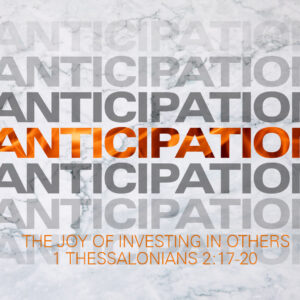Series Summary
anticipation – noun /an-ti-sə-pā-shən/ – A feeling of excitement about something that is going to happen in the future; the visualization of a future event or state.
Paul’s visit to Thessalonica is described in Acts 17, but his stay there was short due to the jealousy of the Jewish leaders, who incited a mob. Paul moved on to Corinth, where he wrote a letter back to this church that he loved. Because of their persecution, they were looking forward expectantly to the return of Christ, with expectant anticipation for what the future held. This letter is filled with encouragement and insight about growing in godliness and faith, and how spiritual growth should be motivated by their hope in the ultimate return of Jesus Christ.
Although a brief letter, 1 Thessalonians is centered on Paul’s message of hope, encouragement, and preparation for the return of Christ. This epistle, one of Paul’s earliest letters, addresses a young church facing persecution and uncertainty. Paul commends their faith, love, and endurance, but also exhorts them to grow in holiness and remain steadfast as they await Christ’s return. The overarching theme of anticipation provides both a source of comfort and a call to action for believers as they navigate the tension between present challenges and future hope.
Paul begins the letter by expressing his gratitude for the Thessalonians’ vibrant faith, love, and hope in the gospel. He reminds them of how the gospel came to them not only in word but in power, and how they became examples to others in their faithfulness. This sets the stage for the theme of anticipation, as their faith points forward to the ultimate hope of Jesus’ return. Paul emphasizes that the promise of Christ’s return gives meaning to their perseverance and fuels their mission to live as witnesses of God’s transformative power.
The theme of Christ’s return is explicitly addressed in every chapter, culminating in Paul’s detailed description of the second coming in chapter 4. His words are encouraging, and issue a call to live as people of the light, avoiding complacency and spiritual lethargy, and to be watchful and self-controlled as we await the Day of the Lord.
To do so requires the pursuit of holiness and love in our everyday lives as we look for Christ’s return. Anticipation of the second coming is not an excuse for passivity but a motivation for active faith and obedience. Believers are to live with the awareness that their actions have eternal significance, striving to please God in all things.
Anticipation. We live with the same sense of expectancy. Paul’s letter of 1 Thessalonians challenges and encourages Christians to embrace a forward-looking faith that transforms the present while eagerly awaiting the fulfillment of God’s promises in Christ.
Sermon Summary
In 1 Thessalonians 2:17-20, Paul expresses his deep longing to be reunited with the Thessalonian believers. He compares their separation to that of children torn from their parents — an emotional and painful image that highlights his sincere love and concern for them. Yet Paul also emphasizes that this separation is only physical and temporary. His heart never truly left them; his affections and thoughts remained rooted in Thessalonica. This speaks to the powerful bonds that form within Christian community — bonds that transcend distance and time.
Despite the separation and Satan’s obstacles, Paul’s joy in the Thessalonians is clear. He calls them his “hope, joy, and crown of boasting” before the Lord. They are not just a church he planted; they are his spiritual family, and he takes great delight in seeing their faith and endurance. Paul’s language here shows the joy and reward that come from pouring into the lives of others for Christ’s sake.
Ultimately, this passage illustrates the joy of investing in others. As Matthew 25:40 teaches, when we serve others, we serve Christ Himself. Watching others grow in faith is a deep and satisfying joy. Paul’s heart for the Thessalonians shows us that Christian ministry is deeply relational, marked by compassion, joy, and a longing to see others flourish in Christ.

